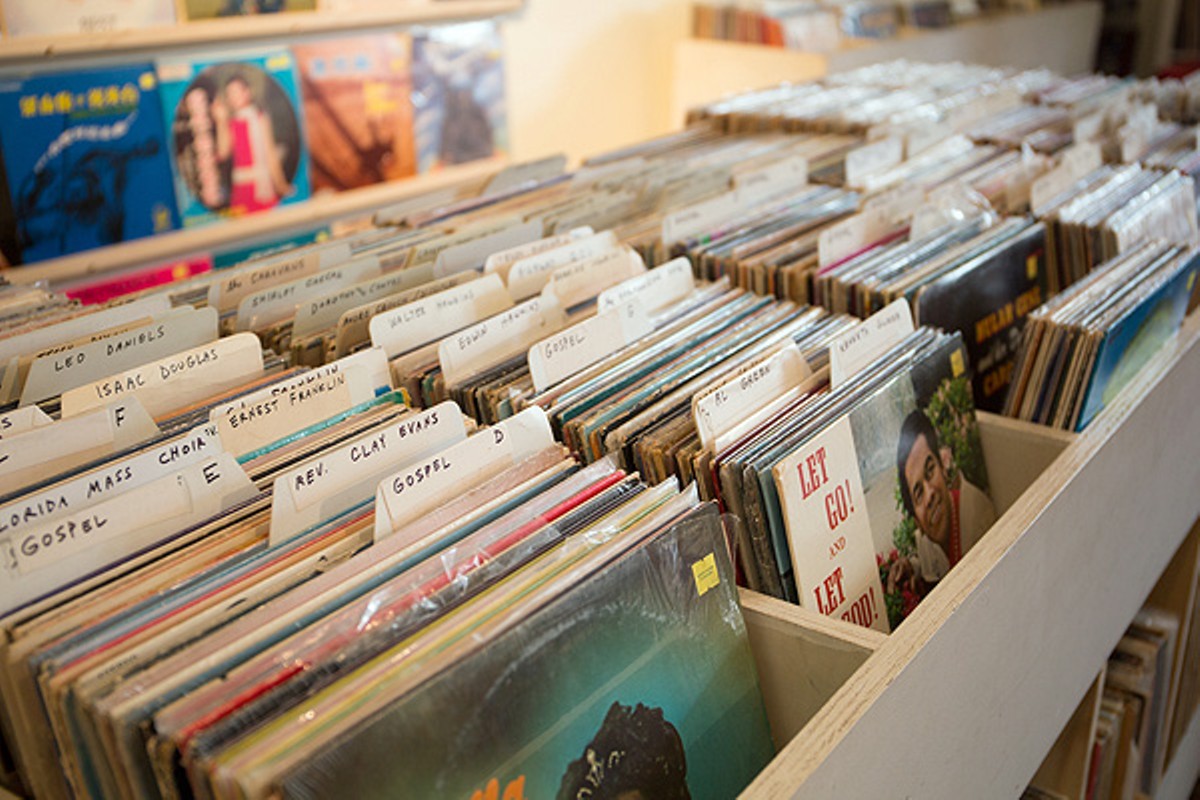Packed to the gills with rare soul, jazz, R&B, and rock, Peoples Records is known worldwide as a key spot for record hunters. The staff is friendly and knowledgeable, but they leave you alone to dig as you want to. Most of the clerks are musicians and DJs, and if you ask what weird funk record they're playing, you're likely to get a graduate seminar-level response. Employee Nathan Shafer praises "the knowledge that Brad brings to the table, plus what we all collectively do." "And there's literally a European TV crew in the store filming once a month," employee and occasional MT writer Johnny Ill says. "I don't know why these people come here to film because they aren't buying records, but Brad is probably on TV once a week in Europe."
Owner Brad Hales projects a super laid-back air while also being highly driven. A longtime bassist for Human Eye, he's been a successful soul DJ for almost 20 years; in the early '90s he helped run a small basement venue in Ann Arbor called the Lab. It's not unheard of to ask after him and hear he's in Germany, now, DJing from a box of small-label soul 45s from the Detroit metropolitan area. Hales grew up around here – Wyandotte, Detroit, and the Ann Arbor area — with brief stints in Florida. Before his parents became evangelical Christians, they were into hard rock. The first 45 he bought when he was 4 years old, at a yard sale on his own block, was by Grand Funk Railroad. He bought it because it was yellow, but it turned out he already knew and liked the song.
Hales started out working at a Musicland store in a mall in 1990. "You had to wear a tie at that point to work at a record store in the mall. I was miserable," he says. In the early '90s, Hales begged the then-owners of Ann Arbor's Encore Records, Peter and Liza Dale, to work for them. "Finally they let me, and that was where I learned the record business. The owners were there all day and worked really hard, but it was still fun and kind of loose and chaotic. I liked all those things about it. I liked their approach."
"As a boss he's pretty amazing," Ill says. "One day when I showed up for work he paid all his employees to take turns walking down to the DIA to just check out the museum for an hour and come back. Taking time off has never been an issue, and Brad is really supportive of you doing other cool things in your life."
Peoples Records is 12 years old and in its third storefront, on the corner of Woodward and Alexandrine, adjacent to the Majestic Theatre. The first shop lasted five years before it got wiped out. "We were in the Forest Arms apartments two blocks away from Wayne State, which burnt down in a fire back in '08. We were in the basement at the time. We lost most of our records and boxes and signs and everything due to water damage, from putting the fire out." At their next location on Woodward and Peterboro, they got priced out after a couple years. Now at their third location, they consolidated all stock to one room. They've also moved some stock and a lot of music ephemera into a large space adjacent to Trinosophes, across from Eastern Market. But at the main space on Woodward, they've had to deal with the constant construction disruptions. "We're hanging in there. People make it to us if they really want to look at records or if they want to sell records; they make it to us, but it has had quite an impact," Hales says.
Metro Times: To back up a bit, why the name Peoples Records in the first place? Brad Hales: Because it was second-hand stuff; I liked the idea because these were people's records. These aren't new records from some factory, but, like, you've got some old guy's records. Also I saw a bakery on South Fort Street called People's Brothers. It had a cool sign and I thought, God that sounds nice, People's. MT: Speaking of signs, you have some notable signage at Peoples.
Hales: I'm a big nut about folk art and for instance, I like to stay off the freeways just so I can see hand-painted signs around the whole city. I noticed that there were great signs around that had been painted by Herman Weems, who was also a Motown songwriter as well as a songwriter and producer with Golden World and Ric-Tic. So when I discovered that he painted signs, for years I had to find him. He became somewhat of a mentor and spiritual adviser for us. He taught us a lot of history, and made these great signs for us.
MT: What is your average day like?
Hales: I have to work six days a week. A record shop is really a labor of love. You're not going to get rich; you're going to lose money as fast as you bring it in. So it has to be fun and interesting. You either have to be mental, or there's nothing else you can do with your life. It's the skill set you've developed. I don't know what other choice I have except for to keep on, like a rat on a treadmill, and just keep plugging ahead with it 'cause it's exciting to hear new stuff and keep learning new things. I can't image what else to do.
It's really fascinating to sift through the rubble here as people clean out all these buildings that have been vacant and think, "Wow what is this stuff? Can we dust these records off? Are they playable?" It's just archeology to me — to dig up and find and restore something and experience it. No matter how stressful it is, I can't think of another job where you could do something like that.
MT: How is it with records coming through the door? As a used store, you must have some fluctuation.
Hales: I work really hard to keep people coming. I work as hard as I can to keep that cycle going. Sometimes we have to educate people as to which records we want. Talk to them, explain to them, give them something even if they don't have anything. Tell them what to look for so they understand it and so they know that way we can both benefit.
The eBay seller "Funkyou!" from St. Louis, who is basically the Wal-Mart of used records, seem to have established themselves in Michigan, because they keep selling rare Michigan singles, week after week. And it's kind of terrifying because things have been extra slow lately, and who knows if that's why? But I will say that it's harder to find good stuff now. Things still come to the surface, but it's tough because so many people are interested in records these days that it's hard to keep up with the demand for something that's not made anymore. I don't think that it's drying up, I just think it's getting a lot tougher.
Johnny Ill: What makes Peoples special is that there's an ungodly amount of random 45s everywhere. According to a good amount of out-of-towners, Detroit has a lot more soul, jazz, and gospel records than other places. So if you're into 45s, you have two things going for you at Peoples. First, there are literally thousands of 45s and secondly, there are a higher ratio of soul and gospel, because who cares about jazz on a 45?
MT: Speaking of eBay, what percentage of your income comes from the store itself and what is through online sales?
Hales: I would say the online sales allow the store to be, just to exist and be open on a day-to-day basis. We're trying to balance things, and it's really important to me that these records do not leave the area, more than they already have. First of all, I don't put albums on eBay. Very rarely will I put an LP online. I try to leave all the albums, including even the rare jazz, for people to come in and buy in person.
MT: You've had this second space adjacent to Trinosophes open for half a year now. What's that been like?
Nathan Shafer: Well there's a lot more space. Also, this store has the museum part. We're right next to Trinos, so that's nice so we get some foot traffic in between. We get some people on the weekends coming down for Eastern Market, a lot more light coming in. It's just a nice space. It's nice being down here.
Hales: I'm glad we have room to spread out and unpack some things that have been packed up, like thousands of 78 RPM records or hundreds of gospel LPs that we didn't have room for anymore when we lost the space upstairs on Woodward. So I'm just excited to let some of these things see the light of day and out there so people can look and listen to them. It's just great to be around Trinos and the energy there, and they've always got good food and good coffee and interesting music playing. It's big and open and I like the light and the energy of Eastern Market.
MT: So when there are events there, you try to keep the shop open at night, correct?
Hales: As much as possible. I'm not able to all the time just because of being in two places right now, it's pretty exhausting. But we try to go to all of them.
MT: And how did the museum come together; when did you first want to do it? The Michigan Audio Heritage Society Museum is a beautiful storefront and gallery.
Hales: I was just accumulating all this stuff and didn't know what to do with it. It didn't make sense to hoard it all in my house or to sell it all. A lot of photographs and paper stuff, newspaper clippings, advertising, promotional materials, contracts, autographs, different pieces of musical ephemera that told the story of what happened here. I was finding stuff from all the time periods that I was interested in and viewed as the most important. We've got a huge backlog of things that we want to frame and display.
MT: Like what? What are the other things?
Hales: Tons of stuff on the history of soul and R&B music. So far I've focused on jazz, and then with the MC5 50th anniversary coming up, that's another factor. But I want to delve more. We've covered jazz quite a bit but I want to start getting more into a lot of other areas — gospel, blues, punk, house music, and techno.
MT: And what's next?
Hales: Instead of having a single exhibition, I want to make more of a permanent installation where every inch of the place is covered with as much as we could possibly fit. The next thing we're working on is this room here [points to a small, glass-paned room where records get cleaned] to be a radio station. We want to have a community radio station, inspired by East Village Radio and by Steve Cherry's small wattage AM 1610 station in Hamtramck. And we're also starting to work on a complete archive of all Michigan recordings.
Peoples Records is located at 4100 Woodward Ave., Detroit; 313-831-0864; Open 11 a.m. - 7 p.m. Monday – Saturday. The MAHS Museum and store is located at 1464 Gratiot Ave., Detroit; 313-831-0864; Open 11 a.m. - 7 p.m. Tuesday – Sunday.







